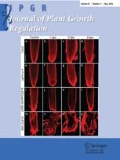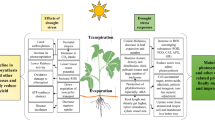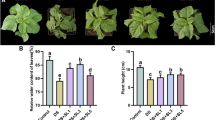Abstract.
High temperatures induced abscission of pepper (Capsicum annuum L. cv. Maor) reproductive organs at various developmental stages. The role of ethylene biosynthesis and auxin economy in high temperature-induced abscission is described. High temperatures somewhat increased ethylene production in the reproductive organs, but the highest temperature treatment, which was the most active in inducing reproductive organ abscission, decreased it. In contrast to ethylene, 1-aminocyclopropane-1-carboxylic acid levels increased significantly in response to high temperatures and correlated positively with the increase in temperature. High temperatures reduced indole-3-acetic acid levels and particularly auxin transport capacity in the reproductive organs. The data suggest that the reduction of auxin transport capacity is the major mechanism by which high temperatures induce reproductive organ abscission in pepper.
Similar content being viewed by others
Author information
Authors and Affiliations
Additional information
Received September 27, 1996; accepted March 13, 1997
Rights and permissions
About this article
Cite this article
Huberman, M., Riov, J., Aloni, B. et al. Role of Ethylene Biosynthesis and Auxin Content and Transport in High Temperature-Induced Abscission of Pepper Reproductive Organs. J Plant Growth Regul 16, 129–135 (1997). https://doi.org/10.1007/PL00006986
Issue Date:
DOI: https://doi.org/10.1007/PL00006986




